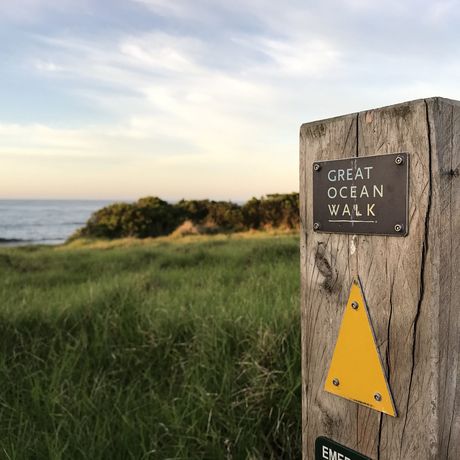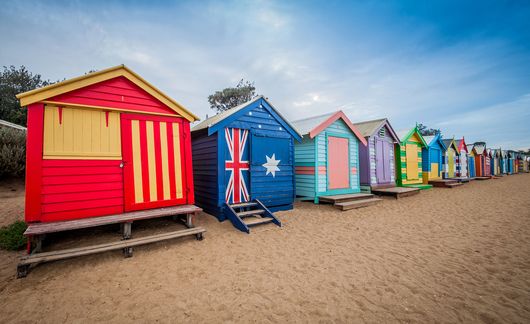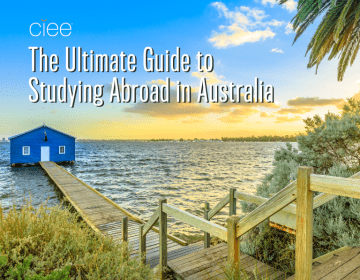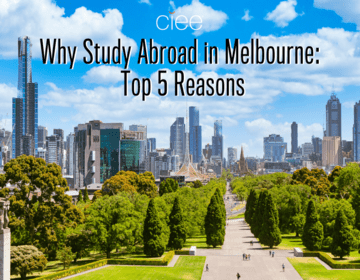
Arts + Sciences (University of Melbourne)
Unique Experiences
Go wildlife spotting at Phillip Island
where you’ll see penguins waddling along the shore and koalas lounging in the trees
Lose yourself in the royal botanic gardens
a sprawling oasis right in the city, perfect for picnics, jogging, or just soaking up the lush scenery
Indulge in Melbourne’s diverse food scene
from the latest foodie trends in the queen victoria market to hidden rooftop bars with jaw-dropping views of the skyline
Your Destination
Melbourne is Australia’s cultural capital, renowned for its vibrant arts scene, diverse cultural influences, and thriving innovation in technology and design. The city blends history with modern flair, offering world-class museums, historic laneways, and cutting-edge architecture. Whether you're studying the arts or sciences, Melbourne provides top-tier academics and a dynamic creative industry. With its lively café culture, diverse cuisine, scenic parks, and energetic urban life, Melbourne is the perfect place to study abroad.

Program Highlights
- Academic Courses: Choose from host institution courses that align with your academic major.
- Immersive Experiences: Participate in activities, excursions, study tours, and more that showcase your host city's culture, values, and local art, film, music, cuisine, and sports scenes.
- Cultural Projects: Volunteer with members of the local community, join university clubs to socialize with your peers, and attend local workshops and events to get to know your host city.

Excursions & Activities
CIEE’s excursions and cultural activities in Seoul will open doors for you to explore South Korea’s rich diversity, language, culture, history, and timeless beauty in ways that will enhance your time abroad.
Samples of past excursions and activities:
- Meet Australia’s unique wildlife up close at Healesville Sanctuary and snap a selfie with a koala or kangaroo
- Enjoy a truly Australian experience with a game of Aussie Rules football or cricket at the iconic Melbourne Cricket Ground
- Witness the magical and world-famous Fairy Penguin Parade on Phillip Island at sunset
Please note: Activities are based on past programs and subject to change at CIEE's discretion to adapt to local circumstances and participant feedback. Our goal when arranging activities is always to enhance your experience.
Program Blogs
Australia vs. New Zealand Study Abroad: Which is Better for You?
You’ve decided to study abroad in the Oceania region. Congrats! You’ve taken the first big step in your study abroad journey. Next up? Choosing between Australia vs. New Zealand study... keep reading
The Ultimate Guide to Studying Abroad in Australia
Known as the Land Down Under, studying abroad in Australia is a once-in-a-lifetime experience. From the country’s stunning coastline and its indigenous history to its modern, multicultural vibe, Australia has... keep reading
Why Study Abroad in Melbourne, Australia: Top 5 Reasons
As the cultural epicenter of Australia, and one of the country’s most vibrant and cosmopolitan cities, Melbourne is an incredible place for a study abroad adventure! From its world-class arts... keep reading
Housing & Meals
Housings
Our housing ensures students are always well-connected to the best of the city. Set in welcoming neighborhoods, students will enjoy a peaceful and secure living environment. Everything you need is within walking distance from home, including various restaurants, supermarkets, and easily accessible public transport options.
Standard Housing: Includes a room in a shared apartment/residence hall or homestay.
- Shared Apartment/Residence Hall: Live with other international students in a centrally located shared apartment or residence hall, on or close to the University of Melbourne’s Parkville campus. You’ll have access to Wi-Fi and all utilities, as well as a fully equipped kitchen, laundry facilities, and comfortable lounge spaces. This option gives you the independence to manage your daily routine while still enjoying the social aspect of living with fellow students.
- Homestay: Immerse yourself in Melbourne’s diverse culture by living with a local family. Melbourne is a multicultural city, and students will stay with families of various nationalities. Homestays are located within a 45-minute to 1-hour commute by public transportation to the University of Melbourne’s main campus. Two meals are included (typically, breakfast and dinner). This is a great opportunity to gain firsthand insight into the local culture, all while having the freedom to explore the city on your own.
A note: The default criterion to assign housing is first-come, first-served; however, other factors may also be considered. If we cannot accommodate your first housing choice, we'll let you know before you arrive. Non-standard housing options require an additional fee that can be found in the program Dates and Fees.
Meals
Shared Apartment/Residence Hall: While meals are not included, students can prepare their own meals in the fully furnished kitchen. Melbourne has a vibrant food scene with fresh food markets providing an array of local fruit, vegetables, meats, spices and more. Students can also explore restaurants and cafés in surrounding areas. You’ll find Melbourne’s food is influenced from all corners of the globe!
Homestay: Students who live with homestay families receive two meals daily (usually, breakfast and dinner). Other meals and/or any snacks are on the student. Students can make use of the kitchen space at the homestay.
Academics
CIEE Melbourne: Located in the heart of the city, the CIEE Center has easy access to all this great city has to offer. As part of a co-working enterprise, CIEE Melbourne shares space with dynamic small businesses and startups with full access to modern and welcoming classrooms and meeting rooms, breakout areas, quiet rooms, Wi-Fi, study booths, printers, and more.
University of Melbourne: Australia’s #1 University and ranked 13 in the world, the University of Melbourne is renowned for its academic excellence, vibrant campus life, historic buildings, and state-of-the-art facilities. Just a short 15-minute tram ride from CIEE Melbourne, the University of Melbourne provides an enriching environment for learning and personal growth.
Course Information
University of Melbourne
The University of Melbourne offers more than 1,300 undergraduate subjects available to study abroad and exchange students. Of these, more than 500 subjects are ‘preapproved’, without any prerequisites for enrollment. The full course catalog can be seen here. See also the handy ‘What can I study Guide’ for links to disciplines and popular subjects.
When searching for courses in the University of Melbourne Handbook, please select the correct filters. Also, note that a University of Melbourne “subject” is equivalent to a U.S. “course”, and that “course” refers to a major or program of study.
The following is a list of sample academic fields that students can study at the University of Melbourne:
Agriculture, land and food
- Agriculture
- Agricultural economics and agribusiness
- Animal science and management
- Biotechnology
- Food science
- Forest ecosystem science
- Genetics and breeding
- Geography
- Landscape management
- Natural resource management
- Plant sciences
- Soil science
- Urban horticulture
- Viticulture and wine technology
Architecture
- Architecture, design and the built environment
- Architectural history
- Design
- Landscape architecture
- Property and construction
- Real estate
- Urban design
- Urban planning and development
Arts
- Cinema and screen studies
- Classics
- Creative writing
- Criminology
- Cultural studies
- Development studies
- English literary studies
- Gender studies
- History
- History and philosophy of science
- Indigenous arts management
- International studies
- Linguistics and applied linguistics
- Philosophy
- Political science
- Public policy
- Social theory
- Socio-legal studies
- Sociology
- Theatre studies
Australian studies
- Architecture
- Arts and culture
- Business and economics
- Environments and sustainability
- History
- Indigenous education and culture
- Landscape
- Literature
- Media
- Politics
- Wildlife
Business and economics
- Accounting
- Actuarial studies
- Commerce
- Economics
- Finance
- International business
- Management
- Marketing
Communications and Culture
- Media and communications
- Asia Pacific media systems
- Creative writing
- Culture and media
- Editing and publishing
- Global media
- Language and media
- Marketing communications
Computer science and information technology
- Computer science
- Geomatics
- Informatics
- Information systems
- Software engineering
- Spatial systems
- Telecommunications engineering
Education
- Creativity and learning communities
- Creativity, young people and learning
- Deafness and communication
- Early childhood education
- Elementary education
- Professional practice and school observation
- Secondary education
- Sports coaching: theory and practice *
- Understanding knowledge
- Youth, citizenship and identity
Engineering
- Biomedical
- Chemical and biomolecular
- Civil
- Computer science and software
- Electrical and electronic (including telecommunications)
- Engineering management
- Environmental
- Geomatics
- Mechanical and manufacturing
- Mechatronics
- Mining
Environmental studies
- Conservation and ecology
- Development technologies
- Ecology
- Energy studies
- Environmental law
- Environmental policy
- Environmental science
- Environmental studies
- Forest ecosystem science
- Surveying
- Water resources management
Humanities and social sciences
- Ancient world studies
- Anthropology
- Archaeology
Media communications theory
- Media futures and new technologies
- Media law
- Media, politics and society
- Media studies
- Online communications
Music
- Ensemble performance**
- Introductory music subjects
- Music history
- Music language (theory)
- Music performance***
Psychology
- Cognitive psychology
- Developmental psychology
- Personality and social psychology
- Quantitative psychology
Sciences
- Agricultural science
- Atmosphere and ocean sciences
- Biochemistry and molecular biology
- Bioengineering systems
- Biotechnology
- Cell and developmental biology
- Chemical systems
- Chemistry
- Civil systems
- Climate and weather
- Computer science
- Domestic animal science
- Ecology and evolutionary biology
- Electrical systems
- Environmental science
- Food science
- Genetics
- Geography
- Geology
- Geomatics
- Human structure and function
- Marine biology
- Mathematical physics
- Mathematics and statistics
- Mechanical systems
- Microbiology, infection and immunology
- Neuroscience
- Pathology
- Pharmacology
- Physics
- Physiology
- Plant science
- Psychology
- Science informatics
- Software systems
- Zoology
Visual and performing arts
- Community cultural development
- Dance
- Fine art
- Music performance
- Production
*Single course only.
**Audition required for some ensembles.
***Audition required.
Full list of restricted courses and off-limits subject areas here.
Note: This course listing is for informational purposes only and does not constitute a contract between CIEE and any applicant, student, institution, or other party. The courses, as described, may be subject to change as a result of ongoing curricular revisions, assignment of lecturers and teaching staff, and program development. Courses may be canceled due to insufficient enrollment.
"(GI)" denotes courses that originated at CIEE's Global Institutes and that are offered at multiple CIEE sites.
Scholarships & Grants
CIEE offers scholarships and grants annually to help students like you make your study abroad dream a reality.
Students who apply to this program are eligible for the following scholarships and grants:
- Ping Scholarships for Academic Excellence
- CIEE Gilman Go Global Grant
- MSI Grant
- Trailblazer Grant
To be considered, submit the CIEE Scholarships & Grants application within your CIEE program application.
Dates & Fees
You get more for every dollar when you study abroad with CIEE, because our high-quality programs include everything from excursions to insurance. There are no hidden charges, and no disappointing surprises when you arrive.
Program |
Application Due |
Start Date |
End Date |
Fees & Housing |
|---|---|---|---|---|
| Program Fall 2025 19 weeks | Application Due Deadline Passed | Start Date | End Date | Fees & Housing $25,850 |
| Program Academic year 2025-2026 | Application Due Deadline Passed | Start Date * | End Date TBD* | Fees & Housing $50,500 |
| Program Spring 2026 18 weeks | Start Date * | End Date * | Fees & Housing $25,950 | |
| Program Fall 2026 18 weeks | Start Date * | End Date * |
*Dates for this program are provided as tentative dates. Please consult with your study abroad advisor to confirm dates before purchasing your flights.
To help you budget, keep in mind that students are responsible for the cost of international airfare, local transportation, books and supplies, visas, and personal expenses. In addition, your college or university may charge additional fees for study abroad, or may require you to receive a transcript via CIEE's School of Record, which carries an additional fee of $500.
Program Fees
CIEE offers the most student support of any provider in its program fee, including an airport greeting, full-time leadership and support, orientation, cultural activities, local excursions, pre-departure advising, and CIEE iNext travel protection with benefits.
| Participation Confirmation | $300 * |
| Educational Costs | $17,356 ** |
| Housing | $8,000 *** |
| Insurance | $194 |
| Total Fees | $25,850 |
Optional Housing
CIEE accommodation options are detailed in the Housing section. Based on availability, Select or Select Plus Housing can be chosen during the application process for an additional fee. Housing is assigned on a first-come, first-served basis; however, other factors may also be considered.
| Select Housing Fee | $1,800 |
Financial Aid
CIEE offers the most grants and scholarships of any study abroad organization, including $8 million/year in travel grants, merit-based scholarships, institutional and MSI grants, and Gilman Go Global Grants.
Estimated Costs
Students are responsible and manage costs related to travel, meals, books, and personal expenses. Below are estimates for consideration.
| Meals not included in program fee | $410 † |
| International Airfare | $1,700 †† |
| Local Transportation | $800 ††† |
| Books & Supplies | $40 |
| Visa Fees | $1,000 |
| Personal expenses | $310 †††† |
| Other | $450 ††††† |
| Total Costs | $4,710 |
*non-refundable fee
**direct cost of education charged uniformly to all students
***Housing fees listed are for financial aid purposes only and should not be considered a basis for calculation of refunds.
†For students in homestays, families provide 2 meals a day. For students in residence halls, you should budget approx. $375 per month for groceries if you plan on making your own meals, and more if you plan on eating out regularly.
††round-trip based on U.S. East Coast departure
†††Transport costs are $50AUD per week.
††††$100 emergency fund + cell phone expense + toiletries
†††††OSHC - Extra Health Insurance for Student Visa
Program Fees
CIEE offers the most student support of any provider in its program fee, including an airport greeting, full-time leadership and support, orientation, cultural activities, local excursions, pre-departure advising, and CIEE iNext travel protection with benefits.
| Participation Confirmation | $300 * |
| Educational Costs | $33,606 ** |
| Housing | $16,400 *** |
| Insurance | $194 |
| Total Fees | $50,500 |
Optional Housing
CIEE accommodation options are detailed in the Housing section. Based on availability, Select or Select Plus Housing can be chosen during the application process for an additional fee. Housing is assigned on a first-come, first-served basis; however, other factors may also be considered.
| Select Housing Fee | $1,800 |
Financial Aid
CIEE offers the most grants and scholarships of any study abroad organization, including $8 million/year in travel grants, merit-based scholarships, institutional and MSI grants, and Gilman Go Global Grants.
Estimated Costs
Students are responsible and manage costs related to travel, meals, books, and personal expenses. Below are estimates for consideration.
| Meals not included in program fee | $410 † |
| International Airfare | $1,700 †† |
| Local Transportation | $800 ††† |
| Books & Supplies | $40 |
| Visa Fees | $1,000 |
| Personal expenses | $310 †††† |
| Other | $450 ††††† |
| Total Costs | $4,710 |
*non-refundable fee
**direct cost of education charged uniformly to all students
***Housing fees listed are for financial aid purposes only and should not be considered a basis for calculation of refunds.
†For students in homestays, families provide 2 meals a day. For students in residence halls, you should budget approx. $375 per month for groceries if you plan on making your own meals, and more if you plan on eating out regularly.
††round-trip based on U.S. East Coast departure
†††Transport costs are $50AUD per week.
††††$100 emergency fund + cell phone expense + toiletries
†††††OSHC - Extra Health Insurance for Student Visa
Program Fees
CIEE offers the most student support of any provider in its program fee, including an airport greeting, full-time leadership and support, orientation, cultural activities, local excursions, pre-departure advising, and CIEE iNext travel protection with benefits.
| Participation Confirmation | $300 * |
| Educational Costs | $17,056 ** |
| Housing | $8,400 *** |
| Insurance | $194 |
| Total Fees | $25,950 |
Financial Aid
CIEE offers the most grants and scholarships of any study abroad organization, including $8 million/year in travel grants, merit-based scholarships, institutional and MSI grants, and Gilman Go Global Grants.
Estimated Costs
Students are responsible and manage costs related to travel, meals, books, and personal expenses. Below are estimates for consideration.
| Meals not included in program fee | $426 † |
| International Airfare | $1,700 †† |
| Local Transportation | $600 ††† |
| Books & Supplies | $40 |
| Visa Fees | $1,000 |
| Personal expenses | $310 †††† |
| Other | $450 ††††† |
| Total Costs | $4,526 |
*non-refundable fee
**direct cost of education charged uniformly to all students
***Housing fees listed are for financial aid purposes only and should not be considered a basis for calculation of refunds.
†For students in homestays, families provide 2 meals a day. For students in residence halls, you should budget approx. $390 per month for groceries if you plan on making your own meals, and more if you plan on eating out regularly.
††round-trip based on U.S. East Coast departure
†††Transport costs are $50AUD per week.
††††$100 emergency fund + cell phone expense + toiletries
†††††OSHC - Extra Health Insurance for Student Visa
Program Fees
CIEE offers the most student support of any provider in its program fee, including an airport greeting, full-time leadership and support, orientation, cultural activities, local excursions, pre-departure advising, and CIEE iNext travel protection with benefits.
Financial Aid
CIEE offers the most grants and scholarships of any study abroad organization, including $8 million/year in travel grants, merit-based scholarships, institutional and MSI grants, and Gilman Go Global Grants.
Estimated Costs
Students are responsible and manage costs related to travel, meals, books, and personal expenses. Below are estimates for consideration.
What's Included
Tuition
Housing
Pre-departure Advising
Advising before you depart to set goals and answer questions
Optional on-site airport meet-and-greet
Orientation
Introduction to your program plus practical information about living in your host city
On-site Staff
Full-time program leadership and support in your city
Cultural and/or Co-curricular Activities
Excursions and/or Study Tours
Travel Protection
CIEE iNext travel protection
24/7 emergency on-site support
Our Staff
Joanna Shaw
Center Director
Jo has lived in Melbourne since she was a child and loves everything about this dynamic and cool city. She has a Masters of International Relations from La Trobe University...
Andrés Bayer Echeverri
Program Coordinator
Originally from the coffee region (Pereira) in Colombia Andres has been living in Australia since arriving as an exchange student 22 years ago. He has worked in education his entire...
Get Started
1
2
Connect With Your Campus Study Abroad Office
Share your plans and confirm you're on track to meet all required steps to go abroad.
3
Contact Us
Send us an email if you still have questions or need information about applying to this program.









